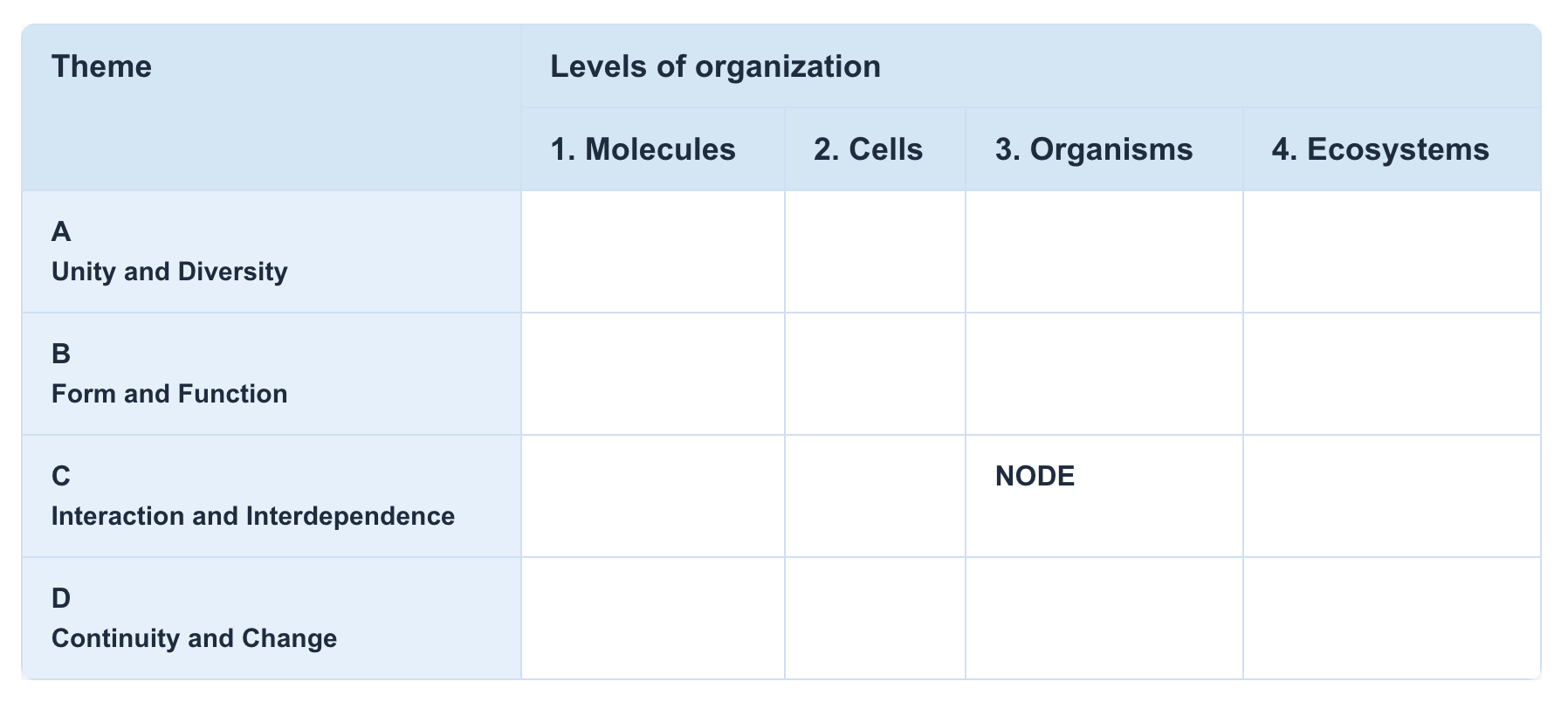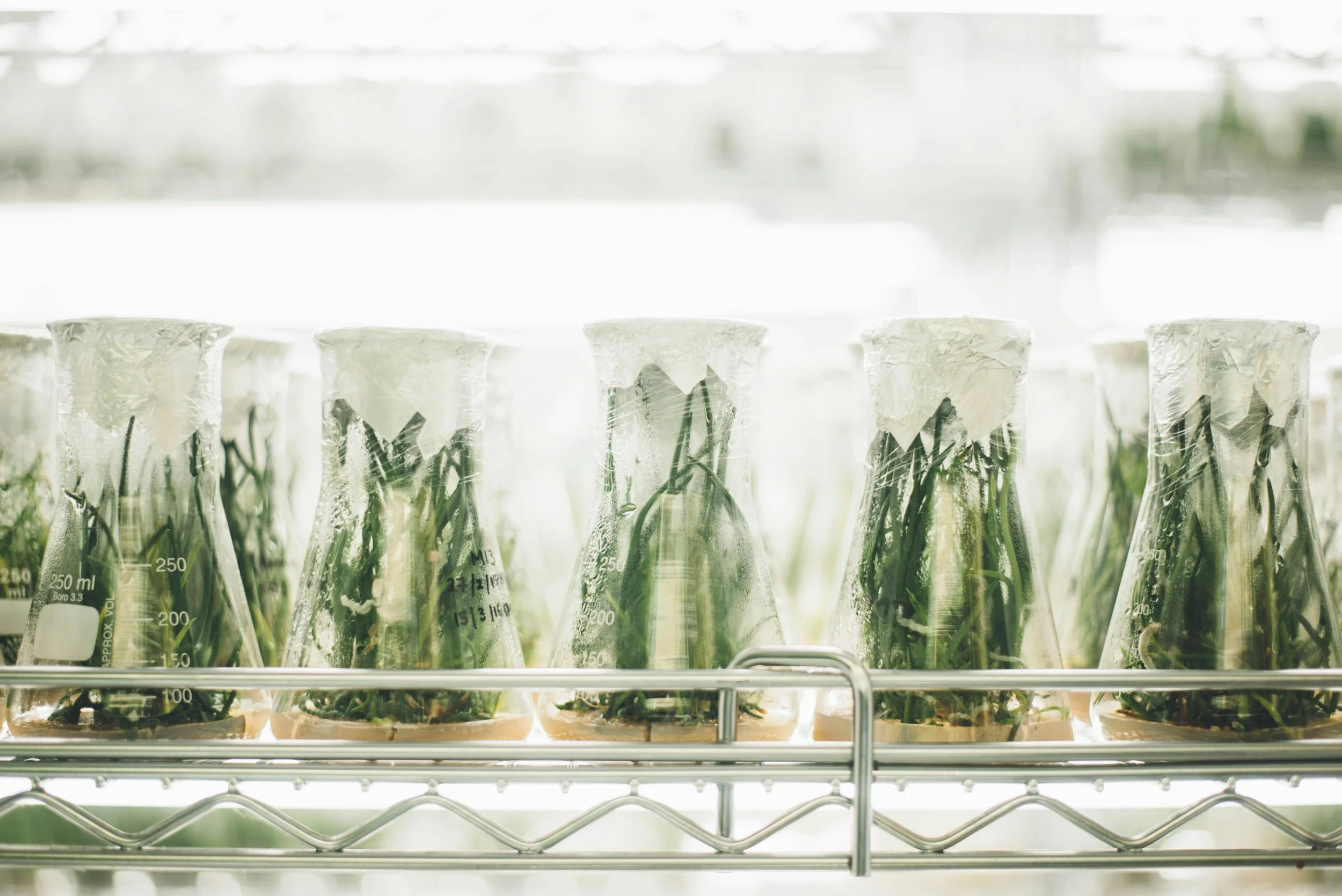Improve your IB Biology grades with our elite IB tutors
Ace your IB Biology Exam and get into the University you’ve always dreamed of. Book your trial lesson with an experienced IB Biology tutor.
Think Smart students now attend
IB Biology Syllabus - Everything you should know
The biology curriculum is organized around four major themes.
Each theme is made up of two key concepts, and examined through four hierarchical levels of organization.
These themes and levels serve as conceptual lenses for understanding the subject matter. Each node corresponds to a specific topic within the curriculum.
IB Biology Syllabus 2025+
HL & SL
| Theme | 1. Molecules | 2. Cells | 3. Organisms | 4. Ecosystems |
|---|---|---|---|---|
| A Unity and diversity |
A1.1 Water A1.2 Nucleic acids |
A2.1 Origins of cells [HL only] A2.2 Cell structure A2.3 Viruses [HL only] |
A3.1 Diversity of organisms A3.2 Classification and cladistics [HL only] |
A4.1 Evolution and speciation A4.2 Conservation of biodiversity |
| B Form and function |
B1.1 Carbohydrates and lipids B1.2 Proteins |
B2.1 Membranes and membrane transport B2.2 Organelles and compartmentalization B2.3 Cell specialization |
B3.1 Gas exchange B3.2 Transport B3.3 Muscle and motility [HL only] |
B4.1 Adaptation to environment B4.2 Ecological niches |
| C Interaction and interdependence |
C1.1 Enzymes and metabolism C1.2 Cell respiration C1.3 Photosynthesis |
C2.1 Chemical signalling [HL only] C2.2 Neural signalling |
C3.1 Integration of body systems C3.2 Defence against disease |
C4.1 Populations and communities C4.2 Transfers of energy and matter |
| D Continuity and change |
D1.1 DNA replication D1.2 Protein synthesis D1.3 Mutations and gene editing |
D2.1 Cell and nuclear division D2.2 Gene expression [HL only] D2.3 Water potential |
D3.1 Reproduction D3.2 Inheritance D3.3 Homeostasis |
D4.1 Natural selection D4.2 Stability and change D4.3 Climate change |
PS. Struggling with certain topics in the IB Biology syllabus? Reach out to us for expert IB help and personalized support!
IB Biology Syllabus Topics 2025+
Standard Level (SL) Topics
(Includes topics that are studied at both SL and HL)
A. Unity and diversity
A1.1 Water
A1.2 Nucleic acids
A2.2 Cell structure
A3.1 Diversity of organisms
A4.1 Evolution and speciation
A4.2 Conservation of biodiversity
B. Form and function
B1.1 Carbohydrates and lipids
B1.2 Proteins
B2.1 Membranes and membrane transport
B2.2 Organelles and compartmentalization
B2.3 Cell specialization
B3.1 Gas exchange
B3.2 Transport
B4.1 Adaptation to environment
B4.2 Ecological niches
C. Interaction and interdependence
C1.1 Enzymes and metabolism
C1.2 Cell respiration
C1.3 Photosynthesis
C2.2 Neural signalling
C3.1 Integration of body systems
C3.2 Defence against disease
C4.1 Populations and communities
C4.2 Transfers of energy and matter
D. Continuity and change
D1.1 DNA replication
D1.2 Protein synthesis
D1.3 Mutations and gene editing
D2.1 Cell and nuclear division
D2.3 Water potential
D3.1 Reproduction
D3.2 Inheritance
D3.3 Homeostasis
D4.1 Natural selection
D4.2 Stability and change
D4.3 Climate change
Higher Level Only (HL) Topics
A. Unity and diversity
A2.1 Origins of cells
A2.3 Viruses
A3.2 Classification and cladistics
B. Form and function
B3.3 Muscle and motility
C. Interaction and interdependence
C2.1 Chemical signalling
D. Continuity and change
D2.2 Gene expression
P.S. Finding parts of the IB Biology syllabus challenging? Get in touch with us for expert guidance and tailored IB support!

IB Biology Assessments
The assessment is divided into External and Internal components.
External Assessment – 80% of the Final Grade
Paper 1A: Multiple-choice questions
Assesses core knowledge and understanding of the syllabus.
Time: 1.5 hours (SL), 2 hours (HL)
Weight: 36%
Paper 1B: Data-based questions
Includes four questions related to the syllabus, covering all themes.
Assesses data analysis and interpretation skills.
This is part of the total Paper 1 time.
Paper 2: Data-based, short-answer, and extended-response questions
Combines data interpretation, concise responses, and longer, structured answers.
Time: 1.5 hours (SL), 2.5 hours (HL)
Weight: 44%
Need help with exam preparation? We’ve got your back!
Internal Assessment – 20% of the Final Grade
Scientific Investigation
An open-ended task where students design and conduct their own investigation.
Involves data collection, analysis, and writing a report of up to 3,000 words.
Time allocated: 10 hours (for both SL and HL)
Weight: 20%
Stuck on your IA? Let’s make it a breeze together.
What's the difference between IB Biology HL and SL ?
In the International Baccalaureate (IB) Diploma Programme, students can choose to study Biology at either the higher level (HL) or standard level (SL). The main difference between the two is the level of depth and breadth of the material covered.
Higher Level (HL) (240h)
Covers the same material as Standard Level, but in greater depth
Students are expected to have a stronger understanding of the concepts and be able to apply them in a variety of contexts
HL students are also required to study additional topics chosen from a list provided by the IB (above)
HL assessments include both external and internal assessments
Standard Level (SL) (150h)
Students are expected to have a good understanding of the concepts and be able to apply them in a variety of contexts
SL assessments include both external and internal assessments
In general, HL Biology is more challenging and time-consuming than SL Biology, as it covers a wider range of material in greater depth and requires more independent research. It is important for students to carefully consider their interests, goals, and academic strengths when deciding whether to pursue HL or SL Biology.
Not sure if you’re good enough for HL? Together, we’ll help you excel!
IB Biology Internal Assessments (IA)
The IB Biology Internal Assessment (IA) is an essential component, demanding students to conduct an independent scientific investigation to showcase their application of biology concepts. Think Smart Biology tutors are instrumental in guiding students through this intricate process.
They provide support in formulating precise research questions, helping students develop robust methodologies, and offering guidance on the collection and analysis of data. Our tutors play a crucial role in ensuring that students present their findings in a well-structured scientific report that meets IB standards.
With the assistance of Think Smart Biology tutors, students can navigate the complexities of the IA, resulting in a comprehensive and well-executed project that not only aligns with IB expectations but also enhances their understanding of biology concepts.
IB Biology Blog Insights
IB Biology resources, written and refined by IB experts for clarity and results.
Our IB Biology Tutors
All Think Smart Biology tutors have once been in your shoes - they are IB alumni.
They've grappled with the same issues and, as a result, can adapt more effectively than the average IB teacher. This enables us to offer you a personalized IB exam journey.
Our emphasis is on fostering a deep understanding of concepts rather than mere memorization of formulas, especially in the context of IB Biology.
What our students and parents are saying on Google (4.9)
Master every IB subject with our expert tutors

The university of your dreams is within reach. Our IB Tutors are already there.
We can help you pass your IB Exam the way we helped thousands of our students.
2k+
students trained
94%
success rate
11+
years of experience




















